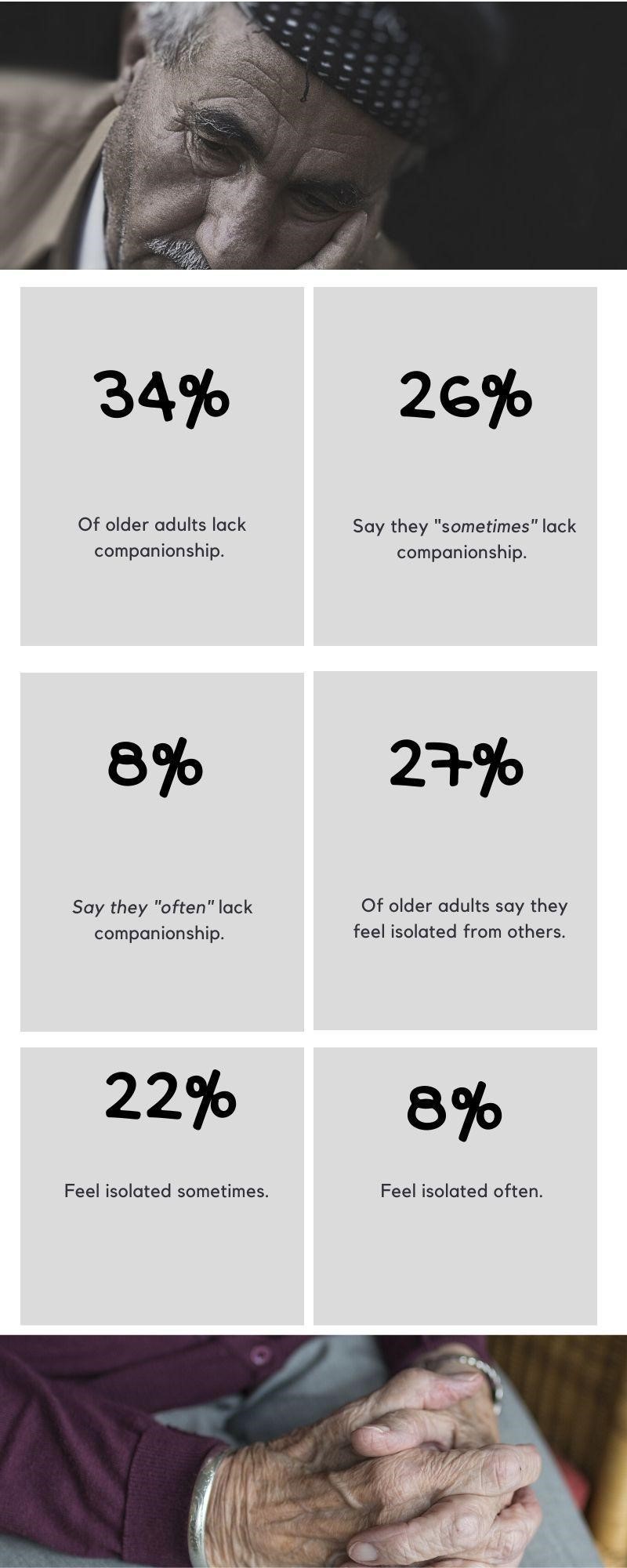 Contact
About Us
Articles
Home
Contact
About Us
Articles
Home

Nobody is untouched by the COVID-19 pandemic. However, we can already see that different demographics are being impacted in unique ways. Those of us who have been paying attention to news reports are already familiar with the way COVID-19 is disproportionately affecting the older Americans in regard to infection and mortality rates. However, the impact is more widespread and nuanced than is evident at first glance. COVID-19 is having a very distinct effect on the mental health of the older population.
Reports from the Centers for Disease Control and Prevention (CDC) make it very clear that adults over the age of 65 are at increased risk for severe illness amid the COVID-19 pandemic. Knowledge is indeed power when it comes to keeping safe against COVID-19. Older Americans need to know that they need to take precautions. However, hearing chatter about the vulnerability of older people in the news cycle daily can be overwhelming for high-risk groups.
Isolation and loneliness were significant problems in the retirement-age community long before COVID-19 entered the picture in early 2020. Unfortunately, quarantine has only widened the existing chasm between adults over 65 and the rest of society. The University of Michigan 2018 National Poll on Healthy Aging provides a good snapshot of the senior experience. Researchers polled American adults between the ages of 50 and 80 to get a glimpse of their thoughts on relationships and loneliness. Here's a look at the findings:

The good news is that it appears that most older Americans are at least enjoying regular social contact with family, friends or neighbors who do not live in the same home. A total of 72% of survey respondents reported this type of communication. What's more, 30% had daily contact with outsiders. A total of 42% saw people from outside of their households at least several times per week. A total of 28% reported social contact at least once a week. However, 13% of those polled did report going several weeks without having contact with anyone. The troubling part is that it's very likely that local quarantine restrictions and fear have caused interactions to dip drastically for most older adults. That means that all of the benefits of social interaction are being wiped away when older Americans need support more than ever.
Unfortunately, it becomes more difficult to handle stress as we age. Even a person who was as "cool as a cucumber" in their younger years may find it challenging to cope with stressful situations today. The uncertainty and risk involved with something like the COVID-19 pandemic can be extremely trying for an older adult. Anxiety and panic attacks are potential outcomes when a person is exposed to a stressful situation without the support system that they are used to relying on.
Any demand placed on your body or brain can cause feelings of stress or anxiety. Anything from a big deadline at work to a car that nearly veers into your lane on the freeway can trigger a flight-or-fight response in the brain. As a result, the body experiences hormonal "rushes" that are designed to spring us into action. It's normal for an older person to have concerns about things like finances or deteriorating health. Stress and anxiety aren't necessarily bad things. They can help us to react appropriately to stressful stimuli by taking cation. Feeling stress or anxiety shouldn't necessarily be viewed as problematic unless long-term mental and physical symptoms accompany the feelings. Our physical or psychological reactions to stress can sometimes be out of proportion to what is happening. Also, things like ongoing anxiety, irrational fears, or feelings of impending doom that aren't caused by anything specific could be signs of an anxiety disorder.
A crisis like COVID-19 can cause a particular type of stress. Many older adults may be experiencing feelings of helplessness. They are worried that it isn't safe to travel outside of their homes for food and supplies. Also, uncertainty about the future may be creating feelings of depression. Those who would typically turn to friends, family, and neighbors for support find that local restrictions and personal fears keep them from being able to reach out.
Prolonged stress and anxiety can evolve into panic attacks. A panic attack is a very terrifying and intense experience where feelings of anxiety trigger physical reactions. The symptoms of a panic attack are so severe and sudden that they are often confused for signs of heart attack or stroke. Doctors can't identify a specific cause of panic attacks. However, it is believed that people who are sensitive to stress or prone to negative emotions are at higher risk. Changes regarding how parts of the brain function are responsible for "sudden" panic attacks in some people.
Panic attacks can manifest in several ways. Many people wrongly assume that you have to be in an active state of fear to have a panic attack. However, they can come on suddenly for what appears to be no reason at all. Here's a look at the common symptoms of panic attacks:
How can you tell the difference between a panic attack and another health issue? It can be difficult. The intensity and wide-reaching symptoms of a panic attack mimic serious health issues like heart disease, heart attack, stroke, thyroid problems and asthma. Generally, a panic attack will last for about 10 minutes. Symptoms associated with other illnesses don't typically subside so quickly.

Assessing your thoughts and mental state in the time leading up to a suspected panic attack can help you to differentiate between a panic attack and severe health issue. For instance, a person should reflect on the types of thoughts or worries that may have been racing through their mind before the panic attack. It's also essential to review the kind of media that was consumed, leading up to the onset of symptoms. A person who was watching news reports about COVID-19 cases or deaths may have been priming their brain for panic.
Long-term exposure to the stress hormones that are released when you experience anxiety can negatively impact your health. Adrenaline and cortisol are two hormones that can put you at increased risk for physical issues like heart problems or weight gain. Here's a look at some of the potential physical effects of long-term stress and anxiety:
Unfortunately, an older adult who is already living with health conditions may find it especially hard to "bounce back" from panic attacks. The fear of experiencing a panic attack again could exacerbate feelings of stress. Compromised breathing or increased heart rate resulting from a panic attack could trigger an acute medical reaction in some cases.
Yes, it's essential to reach out if you're experiencing levels of stress that are impacting your physical or mental health. There are many ways to deal with fear based on your stress levels and medical history. Relaxation techniques, talk therapy and medications are all potential methods for treating anxiety in older Americans .
It's also essential to be on the lookout for signs of anxiety in the months to come. Traumatic events can trigger panic attacks months or years down the road. It may be essential to seek help if you notice that you still feel fearful about going out in public or doing day-to-day activities once COVID-19 restrictions are behind us.
Alliance America is an insurance and financial services company. Our financial planners and retirement income certified professionals can assist you in maximizing your retirement resources and help you to achieve your future goals. We have access to an array of products and services, all focused on helping you enjoy the retirement lifestyle you want and deserve. You can request a no-cost, no-obligation consultation by calling (833) 219-6884 today.


